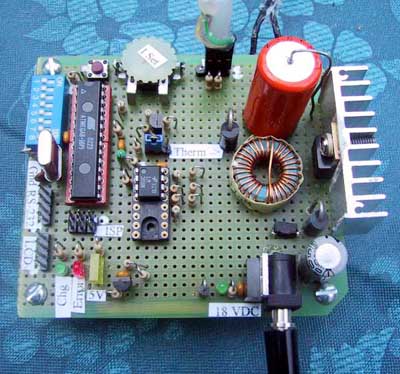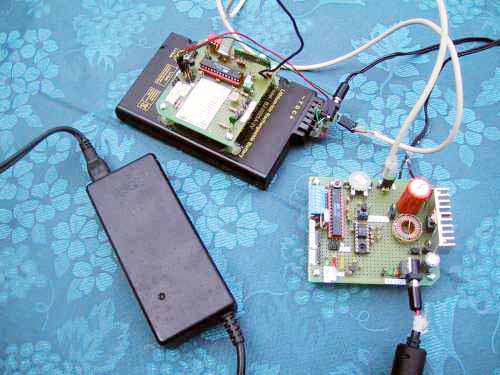This article discusses LiIon batteries and describes a universal Lithium Ion battery charger with a Smart Battery interface based on an Atmel ATMEGA8 microcontroller using GCC ver. 3.2

Overview
Lithium Ion batteries are becoming a practical alternative for robot power. After my robots sealed lead acid battery passed away recently I started looking for a replacement. I took a quick look on EBay and there was a 10.8V 4500 mAh Lithium Ion laptop battery for $20 that I could not resist. This battery has twice the capacity of my sealed lead acid and was 2/3 the price. I later purchased a Gateway 11.1V 6400 mAH battery for $25. Getting my batteries operational vaulted me into a whole new world which has culminated in the Universal Lithium Ion Battery Charger board described in this article.
These batteries really work very well. My robot seems to run forever without requiring a recharge. Alas, all is not perfect however.
Here's what I now know about Lithium Ion (LiIon) batteries:
The Good
- High capacity by weight and by volume - about twice that of NiCads
- High capacity by $ if you can find an unwanted laptop battery, not so if you buy new. Laptop batteries are about the right size for small robots and are becoming plentiful
- Battery packs are often Smart - you can poll them for capacity information and they can control charger settings
- No memory effect
- Lower self discharge - less than half of NiCads
- Fast charge - 2 hours from dead to fully charged is feasible
The Not so Good
- A charge controller is a necessity - a series resistor just won't cut it.
- Inexpensive general purpose charge controllers for high capacity LiIon batteries don't yet exist
- It is hard to find a battery/charger combination at a reasonable price
- The voltage is not constant - my battery goes from 12.6 V to 10.8V over the useful range. Not a problem on my bot, but may be on yours.
- Higher internal resistance than NiCads, but better than Nickel Metal Halide. LiIon is not recommended for applications requiring very high instantaneous current such as power tools. I wouldn't use these on a oboWars bot but they are ideal for bring daddy a beer type service.
- The batteries slowly wear out - losses of 20% of capacity after 500 charge cycles are reported. One report indicated they were no good after two years whether used or not. The jury is still out.
- Not all Smart Batteries talk the same language
- The batteries can be destroyed and even explode (there are mixed stories about this) if improperly charged.
- It is not recommended to completely drain the batteries - most packs have protection against this but I have not found any documentation about the consequences.
The biggest issue is the battery charger. There are some chargers available but they match certain batteries which tend to be very expensive. Many laptops have an internal charger and external chargers are not available. Some batteries cannot be charged at all without a charger that is talking to them in the right dialect. Unless you are lucky enough to find a battery with matching charger you need to either build your own or buy a very expensive universal charger.
This article really describes two separate but related technologies: lithium ion battery charging and Smart Battery communications. Either can exist without the other but they are often found together.
The charging parameters are established using one of three methods: if a Smart Battery is detected, the settings from the battery are used. If the "Custom" switch is selected then the settings are set using on-board dip switches and a variable resistor. If not then predefined sets of parameters are selected based on other dip switch positions.
Here is a picture of the complete charging system. That's my temperature transmitter board mounted on the LiIon battery.

To be continued